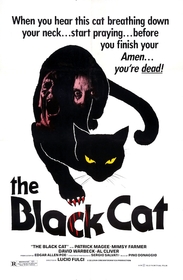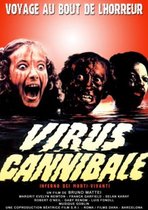Our editor-in-chief Nate Yapp is proud to have contributed to the new book Hidden Horror: A Celebration of 101 Underrated and Overlooked Fright Flicks, edited by Aaron Christensen. Another contributors include Anthony Timpone, B.J. Colangelo, Dave Alexander, Classic-Horror.com's own Robert C. Ring and John W. Bowen. Pick up a copy today from Amazon.com!
The Black Cat (1981)
Lucio Fulci's The Black Cat admits in its opening credits that it is “freely” adapted from the Edgar Allan Poe short story of the same name. Indeed, the film bears only a passing resemblance to Poe's story. Instead Fulci crafts his own tale and forges a movie that succeeds in mood and direction, but fails when the plot descends into incomprehensibility. But just as one doesn't stop eating apples because they end up as horrible apple cores, The Black Cat’s great beginning is worth the lousy finish.
The Black Cat opens with, unsurprisingly, a black cat. It leaps into an open car window, causing a horrific crash before the opening credits. This crash, however, is the first of many fatal "accidents" that this foul feline instigates throughout the film. Our protagonists are Jill Trevers (Mimsy Farmer), a reporter, and Professor Robert Miles (Patrick Magee), a psychic old man who owns the black cat. They investigate these accidents, trying to get to the bottom of what is happening. But the deaths become more frequent and fantastical, until eventually Jill discovers the real truth behind the cat's nature, and is forced to confront it.
While Fulci's films are typically characterized by their gore, The Black Cat focuses on creating an atmosphere, permeated with intensity and unease. It's a mood of twisting the familiar, the friendly countryside harboring some dark, evil secret. Fulci's main tool in setting this mood is close-ups, often focusing on the eyes of the characters. Sequences alternating between shots of the eyes of Robert Miles and those of the cat portray an almost primal tension. How could this pretty purring pet be a killing force of evil? This is what Fulci continues to play off of, the sense of the familiar and the sinister mixing together. Even the limited use of gore plays into this; the decomposing couple in the boathouse and the bloody man smashing through his windshield are glimpses, unsettling flashes, that throw the viewer for a loop, a blast of horror from what had been quite standard surroundings.
Supporting this whole film's mood is Patrick Magee. His performance is subtle, helped with its nuance by Fulci's direction. The best example of Magee’s performance as Robert Miles are in the scenes of him sitting in a darkened room, listening to these disturbing reel-to-reel tapes of what must be EVP (Electronic Voice Phenomena). There is nothing but Magee, his body language, his flickering facial expressions, and the eerie half-unintelligible whisperings. Magee's performance compliments the quiet, intense tone of the film. When Robert is desperately attempting to hunt down and hang his vile cat, Magee plays the scene gently, almost all of his expression solely in his eyes. Without a doubt, he is the star of the cast. Not to say that the other performances are horrible, they're quite acceptable, but Magee is Fulci's MVP, and one of the highlights of the film.
Sadly, however, the creepiness factor begins to wash away as the story wanes on. There are still some wonderful sequences, like the poor woman who is trapped in her burning room and gruesomely catches fire herself and the shadowy, stormy night where the psychic hangs his cat. When the major exposition flows in, however, we lose the horror. It's not that the story isn't original or compelling; the plot is quite interesting while the mystery behind this cat is still shrouded. The initial red herring idea that Satan himself somehow possesses the cat isn't so lame as to ruin the mood of the film, but the more the supernatural intrudes on the film, the more the mood of the normal twisted to the sinister is replaced with the horror equivalent of high fantasy. By the end, the actual reason behind the cat's actions is so ridiculously unbelievable, the illusion of film is shattered and you find yourself just shaking your head at the events unfolding. In the interest of not spoiling you for this big “twist,” I merely say you'll know it when you see it, and you'll wish the cat was simply some evil demon rather than what Fulci actually unveils for us.
Even this ridiculous explanation for the cat’s evil cannot tarnish the rest of the movie. While The Black Cat isn't the right choice if you're looking for a Fulci splatterfest, it's the right movie for when you want creepy, atmospheric horror. Fulci's direction is wonderful, even if his writing degrades as the film progresses. Overall, it's a good way to spend your time, though you will be disappointed at the very end. It's no true classic, but you should still give it a chance.
This review is part of Lucio Fulci Week, the third of four celebrations of master horror directors done for our Shocktober 2007 event.








